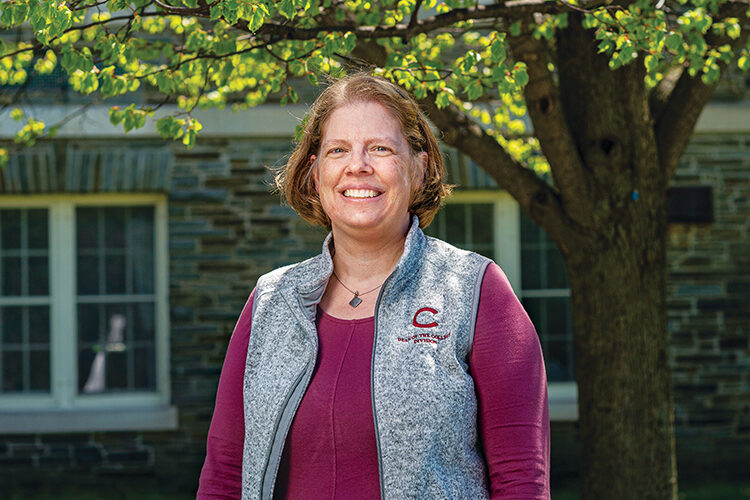Photo by Mark DiOrio
As her normal routine at the University’s Student Health Services turned upside down due to the COVID-19 crisis, Dr. Ellen Larson ’94 spoke to Colgate Magazine in the spring. Learn more about Larson — an alumna; University staff person; Hamilton, N.Y., community member; and parent — as she carries out these multiple roles during unpredictable times.
“[My work] has really changed. In seemingly short order, we were starting to hear about symptoms, and it became clear that it wasn’t that we were going to have one or two students symptomatic and we could move them into an isolation space. We had to figure out how to isolate them in the spaces they were in.
“I have been continuing to review updates in hospital medicine because if the community gets hit hard, I anticipate being asked to help at Community Memorial Hospital. Parts of my days have been spent learning as much as I can about managing hospitalized patients with COVID-19 so that if this community sees a surge of patients that stresses the hospital’s resources, I will be able to be a meaningful part of that team as well.
“I have been doing endless amounts of reading on the virus. I also have been learning about the virus through physician connections. Most of the information I have been accessing comes from several Facebook groups that are physician COVID-19 groups. Some of them are United States based, but many of them are international — people posting from Spain, Italy, China, India, and all over the world. So much of our decision making was coming from what we were learning through the communications from those sites because they’re sharing their experiences: what they’re seeing, what’s working, and what’s not working. They’re also sharing scientific papers as well as information about how to sterilize and reuse masks and equipment, which I’ve been sharing with [colleagues here].
“I have two boys, 16 and 19. The oldest is finishing his first year at RIT [Rochester Institute of Technology], and the youngest is in 10th grade at Hamilton Central School. So I’ve experienced this from the parent perspective too. I think that helps in the role I’m in — understanding how the students who are here and their parents may be feeling.
“When I was in high school, trying to figure out what I wanted to do, I joined the local emergency squad. I became a certified EMT when I was 16, and I really enjoyed that environment. It was a time when there was a shortage, much like now, of rural family doctors. I started reading stories in the news about rural family doctors, and it just fit. It felt like the right thing. I stumbled upon Colgate and fell in love with it from the first visit. My senior year at Colgate, I was already accepted to medical school and I knocked on the door of a family doc in town to ask if I could follow him around to see what his day was like. I spent time in his office, and I absolutely fell in love with rural family medicine. As I was finishing residency and starting to look for a job, this was still a model family practice town. It was my dream place to work and raise a family. I worked for Bassett Healthcare in Hamilton until November of this year.
“Making the transition out of family medicine to college medicine, the hardest part was giving up those long- standing relationships with families. Before I started working at Colgate, I delivered the first baby of a baby whom I had delivered. I had been there long enough for that second generation to happen. That connection to those families, their stories, and understanding how all of those pieces play into people’s wellness and care is what I love about family medicine. It’s what I still look for with students here, their stories and how those connections for them affect their well-being and care.
“As I was leaving Bassett, a patient told me that one of the reasons she stayed with me was that she had asked me a question the first time I saw her and I said, ‘I don’t know, but I’ll find out.’ For me, being honest about what you know and what you don’t know is part of how you build trust with people. Once you have trust, you can work through just about anything. So a big part of this [crisis] for me has just been being able to say, ‘We don’t know, but we’re finding out as much as we can and we’re going to keep doing the best we can to keep everybody safe.’”

